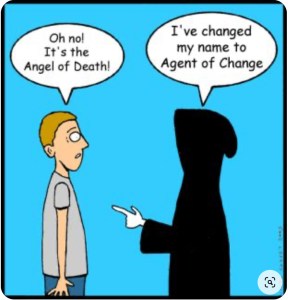
Increasingly, I am noticing that people in organisation development (OD) seem to delight in describing themselves as change managers, change makers, or change agents. To see people across the occupation embracing such terms leads me to conclude that these titles are seen to be positive. However, in paying attention to this apparent development, I am forced to go back to first principles in thinking about the notion of change in corporate contexts that are completely inscribed with power and often steeply hierarchical.
At the risk of sounding even more like a cracked record than I tend to do these days, the work of Tsoukas and Chia is extremely useful in this regard, insofar as the authors contest the supposition that the stability of organisation is the norm, whilst change is the exception. They prefer to invert this simple modelling: they propose that change is innate and natural in organisational life and that organisation is an unhelpful solidification in corporate contexts, which can very often constrain that change.
This means that people in organisations should be actively attending to the ebb and flow of change as an intrinsic element of their existence in the workplace. Allowing that change to emerge allows people to immerse themselves in the to and fro of their corporate life and to ride the currents that surround them so as to find new – and hopefully better – ways of being and doing in that organisational setting.
In most companies, however, the experience of change is very different. Instead of it being seen as an innate quality of the dynamics of people coming together with a commitment to work collectively towards a common purpose, it is seen as something programmatic that has to be imposed.
Those who are content to assume the mantle of these notionally benign descriptors of change manager, maker, and agent are perhaps overlooking what undergirds this perspective on delivering change in a corporate context, namely the imposition of a managerially sanctioned vision onto a wider population, with the manager, maker or agent imbued with a power derived from the structure of the organisation or system to find ways to inculcate that ideological position into the workforce.
Change in human history
Human history is depressingly littered with both small and large instances of the imposition of change programmes, in contrast to allowing people to immerse themselves in the change that defines what it is to be a human being in a social context. Hindsight allows us now to recognise that the Russian Revolution of 1917 had a grassroots element but was mostly defined and actively directed by a small group of people under the leadership of Lenin.


The positive and popular sentiments that were seen to undergird that vision of a different and more positive future were patently motivational – but ultimately the clique that drove that programme forward neglected those motivations in favour of a practice that subsumed the population and merely imposed through ferocious structures their model of how they wanted the future to be.

What looked to be a profound rupture in the social fabric of humanity – something that carried with it a sense of unshakable permanence, in light of the climate the government of the Soviet Union sought to generate, the changes in the socio-economic infrastructure it led, and the ways it found to surveil and tightly manage its population – lasted a grindingly oppressive 74 years before collapsing and disappearing. Paradoxically, it reminds us of Marx’s observation in regard to the pace of change in capitalism that “All that is solid melts into air”.
Tangentially, it’s worth noting how Lenin transitioned from iconoclast to idol. In many ways, he sought to personify the changes that he and his activists were looking to promote. Gradually, though, those commitments were challenged by circumstances where he experienced an apotheosis, partly of his own making but broadly arising out of the processes in which he was involved. Lenin was a change manager, maker or agent – but, over time, his attempts at delivering on a programme rather than creating the circumstances where people could support change as an organic phenomenon ended in tragedy.
Championing change while rejecting programmes
Those of us working in OD often feel extremely constrained in terms of the work that we’d like to do and the work that we are expected to do. We sense in our practice how our organisational presence can be genuinely facilitative, in terms of generating space and time for people who work in our companies to speak freely about their circumstances and their perceptions as to how things might be helpfully different in the work environment. And yet that potential is very rarely reached, not least because those who commission our work lack the courage to give us leeway to work in this way. Instead, they incorporate us, delegating an expectation that we should merely do their bidding.
This can often put us in an invidious position, where we find ourselves serving an agenda that resides firmly in the fabric of power that forms the underlay of our corporate lives. In that sense, we are managing, making and delivering the programmes of change that are more about shoring up managerialism than supporting people to find ways to improved organisational experiences and efficiency.
Making space for change, as opposed to imposing it
This is why John Higgins and I have been supporting an inquiry into the work presently undertaken by those associated with OD in the National Health Service (NHS)…and what those thoughtful and talented individuals might actually be doing if given licence so to do, in order to assist the service to address its current challenges and ambitions.
The role of change manager, maker or agent may seem exciting and high profile. It may increase our sense of relevance and status in the organisation. But we need to ask ourselves two questions, if these are labels that we seek to acquire:
When we speak of change, whose change are we talking about?
When we envisage our management, making, and agency in respect to that change, what will we actually be doing – and how might those to whom we do it experience it?
When we step into this type of formulaic approach to change – delivering a managerial imperative, as opposed to create a meaningful dialogic space in which people can make sense of their experiences and discuss ways of being, thinking and doing that are different to the way in which things normally happen – we can far too often fall back on the familiar repertoire of OD thinking, models, instruments, and practices that we so often insinuate reside in something we laughably call our toolkit.
In that sense, we unthinkingly drift into the scripted practice of OD, where the plot is defined by a playwright over whom we have no control, and we direct the scenes in which the people with whom we work act out their roles.
At that point – as we find ourselves wheeling out our post-its, flip charts, and blue-tak, and compelling people to engage with infantilising activities – we should actively look to replace the play that we are seeking to direct with an improv session, where people have the liberty to control the space themselves instead of expecting us to manage it for them, pulling them through a carefully timed series of exercises that – to paraphrase The Smiths in the song Panic – say nothing to them about their lives.
Above all else, we should take the opportunity to rethink change in the workplace – and to critically consider our role in it – rather than embrace titles that implicate us in an organisational power play.

